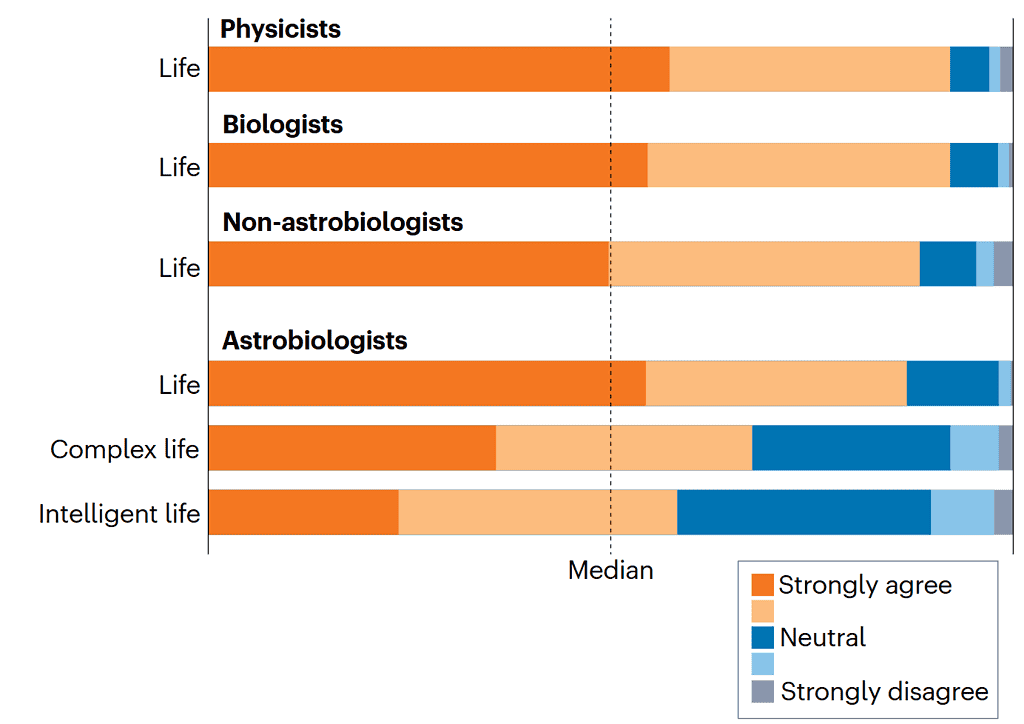We’ve all thought about it. Are we really aliens out there, or are we all alone in the universe? Unsurprisingly, scientists think about it too. Now, a new survey published in Nature Astronomy analyzed what researchers believe. Turns out, if you ask the average scientist, they think aliens are very real. Most researchers even think intelligent, advanced aliens are out there.
In 1964, George Gaylord Simpson famously remarked, “[astrobiology] has yet to demonstrate that its subject matter exists.” It’s a strange idea to think that what you’re studying may not even exist and yet, there isn’t any clear signs of alien life. But then again, we’ve only scraped the surface of our very own solar system, let alone the vastness of intergalactic space.
That’s why a team led by Peter Vickers from Durham University set out to ask astrobiologists (and other researchers) what they think. Between February and June 2024, they surveyed over 1,700 scientists, asking them to weigh in on the likelihood of alien life. In total, 521 astrobiologists and 534 non-astrobiologists responded.
Respondents were asked to agree or disagree with the existence of:
- Basic Alien Life: Simple life forms, like microorganisms, are likely to exist somewhere in the universe.
- Complex Alien Life: Larger, more intricate organisms likely exist.
- Intelligent Alien Life: Advanced beings with cognitive abilities comparable to humans are likely.
When it came to basic life, the response was overwhelming. There’s essentially a consensus among researchers that basic alien life exists (both among astrobiologists and those studying different fields). Among astrobiologists, 86.6% agreed that basic extraterrestrial life is likely, with only 0.4% strongly disagreeing. Similarly, 88.4% of non-astrobiologists agreed, showing little difference between the groups.
This challenges a long-held assumption that astrobiologists, by virtue of their field, are more optimistic about extraterrestrial life than their peers. Non-astrobiologists seemed to be just as confident in the existence of life.
“According to our results, the consensus of relevant experts — broadly construed — that extraterrestrial life (of at least a basic kind) exists, stands at 86.6%, with less than 2% disagreement. The significant proportion of ‘neutral’ votes (11.5%) is, however, revealing, and probably reflective of the lack of direct evidence supporting an agreement or disagreement vote.”
What about complex life?
As you’d expect, the agreement dropped when it came to complex life. For organisms beyond the microbial level, agreement dropped to 67.4% among astrobiologists. When asked about intelligent extraterrestrial beings, only 58.2% of astrobiologists believed in their likelihood. While it’s still a majority, it suggests that researchers are more skeptical about the evolution of intelligence outside Earth.
What was more surprising was how much physicists and biologists agreed. Physicists are often thought to emphasize the vastness of the universe and the statistical probability of life, while biologists focus on the complexities of life as we know it. The results revealed no significant differences between the two groups, dispelling the notion of a disciplinary rift in perspectives on extraterrestrial life.
“Our results indicate that such generalizations cannot be empirically supported. Responses from physicists and biologists were not significantly different,” the researchers write in the study.

While the survey revealed strong agreement on the likelihood of basic extraterrestrial life, there’s something strange about the survey. Why do so many scientists believe something without any direct evidence? Isn’t everything in science based on evidence? Well, scientists are basing their beliefs on logical inferences, such as the sheer number of potentially habitable planets and the adaptability of life on Earth.
In fact, as the study authors emphasize, this is perhaps a weak consensus given how many planets (and potentially habitable planets) there are out there.
“Perhaps it is not, actually, a surprisingly strong consensus. Perhaps it is a surprisingly weak consensus. Consider the numbers: there are more than 100 billion galaxies. And we know that habitable environments are everywhere.
“Let’s say there are 100 billion billion habitable worlds (planets or moons) in the universe. Suppose we are such pessimists that we think life’s chances of getting started on any given habitable world is one in a billion billion. In that case, we would still answer “agree” to the statement that it is likely that alien life exists in the universe.”
“Thus, optimists and pessimists should all have answered “agree” or “strongly agree” to our survey, with only the most radical pessimists about the origin of life disagreeing.”
So, where do you stand, ZME Science reader? Are there any aliens out there? What about complex life?
The study was published in Nature.
This post was originally published on here







